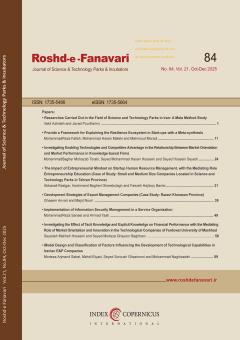Publication Ethics and Malpractice Statement
The Journal of Roshd-e-Fanavari is a member of the Committee on Publication Ethics (COPE). Agreement upon standards of expected ethical behavior for all parties involved in the act of publishing; the authors, the journal editors, the peer reviewers, and the publisher.
The papers will also be checked from plagiarism viewpoints using the Hamtajoo service. Any paper with an above 30 percent overall similarity with other papers will be rejected.
Principles of Ethical Publishing in the quarterly Journal of Roshd-e-fanavari:
- That the corresponding author has the approval of all other listed authors for the submission and publication of all versions of the manuscript.
- That all people who have a right to be recognized as authors have been included on the list of authors and everyone listed as an author has made an independent material contribution to the manuscript.
- That the work submitted in the manuscript is original and has not been published elsewhere and is not presently under consideration of publication by any other journal. The oral or poster presentation of parts of the work and its publishing as a single page abstract does not count as prior publication for this purpose.
- That the material in the manuscript has been acquired according to modern ethical standards and does not contain material copied from anyone else without their written permission.
- That all material which derives from prior work, including from the same authors, is properly attributed to the prior publication by proper citation.
- That the manuscript will be maintained on the servers of the Journal and held to be a valid publication by the Journal only as long as all statements in these principles remain true.
- That if any of the statements above ceases to be true the authors have a duty to notify the journal as soon as possible so that the manuscript can be withdrawn.
Scientific Misconduct and Unethical Practices
The Roshdefanavari Journal accepts the definitions of plagiarism, fabrication and falsification, Scientific misconduct and unethical acts proposed in the:
- ACECR (Academic Center of Education and culture of Research),
- Ministry of science, Research and Technology,
- of Culture and Islamic Guidance,
The list below includes, but is not limited to, the following prohibited acts:
- Plagiarism, which includes the theft or misappropriation of intellectual property and the substantial unattributed textual copying of another's work. It does not include authorship or credit disputes. The theft or misappropriation of intellectual property includes the unauthorized use of ideas or unique methods obtained via a privileged communication, such as a grant or manuscript review. Substantial unattributed textual copying of another's work is defined as the unattributed verbatim or nearly verbatim copying of sentences and paragraphs which materially misleads the ordinary reader regarding the contributions of the author. It does not include the limited use of identical or nearly identical phrases which describe a commonly used methodology or previous research. The author must show the editor written permission to quote any information learned personally from another investigator or by reviewing applications for research grants. In the introduction, and especially in the discussion of a paper, the author should cite fairly the work of others that is relevant either to the origin or to the outcome of the research described, including references to original findings and seminal works.
- Fabrication, which includes making up results and recording or reporting them, in whole or in part.
- Falsification is manipulating research, materials, equipment or processes, or changing or omitting data or results such that the research is not accurately represented in the research record. It includes the suppressing or altering of data not in agreement with one's hypothesis.
- Redundant or duplicate publication, which includes the submission of a paper, or portion thereof, that overlaps with one already submitted or published. An author may not submit reports of the same or substantially overlapping research to more than one journal at the same time, unless the author can justify it in letters to both editors.
- Submission of animal or clinical research conducted without the approval of the institutional animal care and use committee or review board.
- Honorary authorship is not permitted in The Roshdefanavari Journal. Honorary authorship is the inclusion of authors who have not met The Roshdefanavari Journal’s definition of authors as described above. An author's signature on the copyright release form submitted with the manuscript and included in the byline of the manuscript indicates that the author agrees to share responsibility and accountability for the results. Alleged misconduct against an author on a manuscript will automatically entail investigation of all co-authors.


